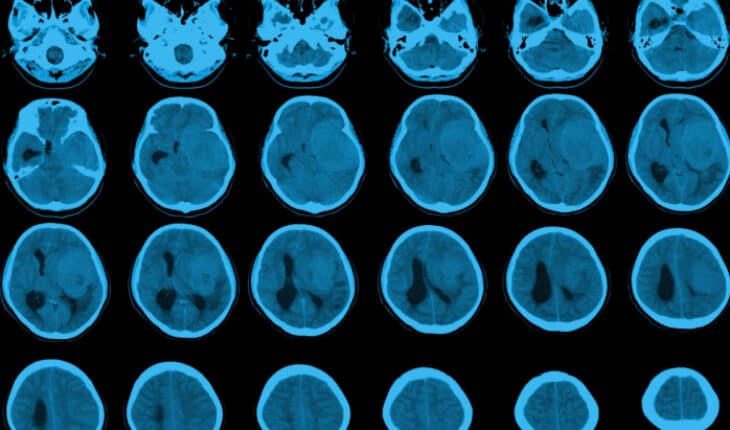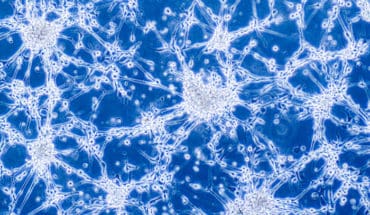Understanding why deadly brain cancer comes back: The deadliest form of brain cancer returns because tumours adapt to treatment by recruiting help from nearby healthy tissue, say researchers who are trying to find a cure for the disease.
A new study, by a global team including University of Leeds experts, has found that in response to treatment, high-grade gliomas appear to remodel the surrounding brain environment, potentially creating interactions with nearby neurons and immune cells in ways that protect the tumour cells and hide them from the body’s defences.
The team also found that lower grade tumours often develop a new mutation that allows the cells to start dividing more rapidly, potentially catapulting them into a higher-grade form.
Glioma brain tumours are rare, but a diagnosis is devastating because there is currently no cure. Low-grade gliomas have a better survival rate than, but often progress to high-grade gliomas. More than 90% of patients with high-grade tumours die within five years.
Current treatments include surgery, radiation therapy and chemotherapy. The findings indicate that new drugs are needed to supplement these.
Dr Lucy Stead, Associate Professor of Brain Cancer Biology in the University of Leeds’ School of Medicine, and the lead UK academic for the study, said: “The brain is a hugely complex organ made up of lots of different types of cells, and brain tumours are equally diverse and complicated.
“Learning from patient tissue is the best way to cure the patient disease. This study, which required a global effort to acquire enough glioma samples to adequately power it, has allowed us to gain unprecedented insight into how these deadly tumours progress, and ways that we might finally be able to stop them.”
Sue, a brain tumour patient from York, died in September 2017 after a seven-year battle with the disease. Her husband of 50 years, Geoff, is now an ambassador for Yorkshire’s Brain Tumour Charity, taking part in events to help raise funds for brain cancer research and awareness.
Welcoming the findings, he said: “Sue fought bravely and without a single word of complaint or self-pity for 7 years. This is my driver. The types and positions of tumours make this a difficult one to actually “solve”. But it is a scandal that the survival rate for brain tumours is no better now than 40 years ago.
“It seems from my experience that a one size fits all approach is applied to treatment at the moment and any form of targeting treatment specifically to suit the person must be an improvement.
“The fact that research is being undertaken has also a beneficial effect for patients and their families. It generates hope.”
The researchers are investigating why gliomas progress to a higher-grade form, and why they survive and continue to grow after treatment.
They collected multiple samples of gliomas over time, as they transitioned from low-to-high grade, and before and after treatment. They then looked at how the cells changed and adapted to see if they can find ways to stop them, using novel drugs.
The mutation and previously unknown cellular interactions could now be targeted with novel drugs that stop the tumour cells progressing and adapting to treatment. In this way the study has opened new avenues of research that may yield more effective drugs to offer patients.
The research was led by Jackson Laboratory (JAX) Florine Deschenes Roux Chair Professor and senior author Dr Roel Verhaak and Postdoctoral Associate and Jane Coffins Childs fellow first author Dr Frederick Varn.
Dr Varn said: “By analyzing genetic and transcriptional data from this large cohort of patients, we are beginning to appreciate how tumors are changing to adapt to standard-of-care therapy.
“This study has made it clear that not every tumor changes in the same way. Knowing this is going to allow us to develop therapies that are better tailored towards each patient’s disease in the future.”
Dr Verhaak said: “The GLASS project has built tremendous momentum and is just getting started.
“We are well underway to tripling our patient cohort and datasets. We are poised to comprehensively dissect the process of resistance and make important progress towards better outcomes for patients with a glioma.”
The University of Leeds’ involvement in this international consortium is partly due to the presence of The Leeds Neuropathology Research Tissue Bank, which is co-funded by Yorkshire’s Brain Tumour Charity and OSCAR’s Paediatric Brain Tumour Charity
Marie Peacock, CEO at Yorkshire’s Brain Tumour Charity, said: “We are delighted to be co-funding The Leeds Neuropathology Research Tissue Bank, ensuring that we have the research infrastructure needed to undertake research right here in Yorkshire to find new treatments and ultimately a cure for brain tumours.”
Marie Hughes, who set up OSCARs Paediatric Brain Tumour Charity after her son died of a brain tumour in 2014, and whose husband and another son died from brain tumours in the past two years, said: “Supporting the work of The Tissue Bank is so important to us. Gliomas are the most common brain tumour in children and the research being conducted due to the presence in Leeds of this important research resource is essential in tailoring treatments to be less devastating and more efficient, and improving life outcomes.
“This is an extremely exciting project to be involved with as the impact that it will have on brain tumour research not just in Yorkshire but nationally and globally is enormous.”
“Glioma progression is shaped by genetic evolution and microenvironment interactions” is published in Cell.
University of Leeds
The University of Leeds is one of the largest higher education institutions in the UK, with more than 38,000 students from more than 150 different countries. We are renowned globally for the quality of our teaching and research.
We are a values-driven university, and we harness our expertise in research and education to help shape a better future for humanity, working through collaboration to tackle inequalities, achieve societal impact and drive change.
The University is a member of the Russell Group of research-intensive universities, and plays a significant role in the Turing, Rosalind Franklin and Royce Institutes.
Yorkshire’s Brain Tumour Charity: Yorkshire’s Brain Tumour Charity is Yorkshire’s leading brain tumour charity dedicated to raising funds for life changing research and patient support. YBTC is entirely reliant on donations and receives no statutory funding.
Founded in February 2003, originally Andrea’s Gift, we changed our name to Brain Tumour Research & Support in 2011, and in 2020 rebranded as Yorkshire’s Brain Tumour Charity.
YBTC exists to support all brain tumour patients (adults & children) and their families, across Yorkshire.
Support ranges from information, advice and guidance, to counselling and emergency grants. We also aim to cater for anyone in Yorkshire who has been affected by a brain tumour through our regular support meetups, drop-in cafés, wellbeing walks and get-togethers.
YBTC has funded research and continued learning at Leeds Teaching Hospitals Trust, the University of Hull and the University of Sheffield
OSCAR’s Paediatric Brain Tumour Charity
OSCAR’s Paediatric Brain Tumour Charity was set up in November 2014 by the parents and friends of nine-year-old Oscar Hughes from York, and stands in memory of him, as well as his father Ian, and little brother Milo, who also recently died of brain tumours. It looks to fund Ongoing Support, Care, Awareness and Research (OSCAR) for children with brain tumours and their families and is happy to work with anyone from across the UK.
The charity is committed to doing all they can to help children with brain tumours as well as their families and is in the process of setting up a number of new projects. Having seen first-hand the devastation brain tumours can cause, it has given the charity an understanding of what children and families may need and a drive to improve their lives and experience as well as work with researchers to find the best possible and kindest treatments for children.
OSCARs PBTC relies solely on the fundraising of new and loyal volunteers and supporters to help with its aims. By supporting OSCARs PBTC, you can work towards making life easier, better and longer for any child with a brain tumour and you can provide hope to children and families in their time of greatest need.
More about the charity can be found at oscarspbtc.org and via Facebook, Instagram and Twitter by following @oscarscharity and they can be contacted via [email protected].
- Combination of drugs could prevent thousands of heart attacks - 21st April 2025
- UQ Study Links Poor Teen Diets to Heavy Social Media Use - 21st April 2025
- Gut microbiome could delay onset of type 1 diabetes - 3rd April 2025






